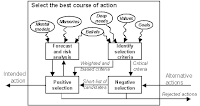Best Way To Solve Critical Issues Of Family
Best Way To Solve Critical Issues Of Family
 |
Family, Md. Lutful Huda
|
 |
Critical, Md. Lutful Huda
|
General
1. All families have problems to deal with. One of the keys to successful family functioning is the family's ability to solve problems. However, research indicates that competent families solve problems as they arise; whereas, families that avoid problem solving, or seem incapable of dealing with many of their problems have more difficulties. Families who successfully and quickly resolve problems have developed skills to manage their difficulties. They are aware of the steps in the problem solving process and they consistently implement them to resolve problems. Problem solving is a process skill that, like other skills, can be learned by the family. The following steps will assist you in establishing a problem solving process in your family:
Identify The Problem
2. Firstly you need to identify and better understand as to what the problem is about. Knowing the real problem or issue is half the battle. Although this may seem like a simple step, many families have difficulty with it. Families need to define and agree on what type of problem they are dealing with. For example, is it an instrumental issue related to how the family accomplishes a task, or is it an affective meaning 'feeling and emotions' issue? In some cases it may be both. Families may identify the instrumental problem but miss the affective side and wonder why the issue wasn't resolved. Therefore, families must practice problem identification and agreement in problem solving.
Probable Course of Actions (COAs)
3. The problem solving process is searching and finding out COA with it's advantages and disadvantages of every options. By brainstorming, the family generates COA and solutions surrounding the identified problem. Make a list of your COA's. The creative COA step leads to effective solutions to problems. COA should take into account both instrumental and emotional issues and should include all family members who are affected by the issue.
Evaluate COA's
Evaluate the COA's and solutions the family has generated. Each of the COA's should be discussed with advantages and disadvantages. Each family member should give his/her opinion of the idea. Eliminate the solutions that the family is unwilling to try. The goal is to find a most probable COA to solve the problem amicably for the greater interest of the family.
Choose Most Probable COA
Evaluate all the COA's and solutions. Decide with a threadbare discussion with the family as to which COA's or options or idea or ideas you are willing to follow. This is known as the action plan. The action plan includes what the family is going to do, and when it will be done. Once you have chosen a solution, write down a summary of it. This will help your family remember what the plan is supposed to do. Putting the plan in writing enables everyone to better understand the plan and their part in resolving the problem or issue. A written action plan is also helpful for monitoring your family's solution, which is the next step in the problem solving process.
Monitoring The Solution
Monitoring the solution is critical to the problem solving process. By monitoring the action plan, your family can keep track of their progress. This will remind of what the family decided to do, which family member is going to do it, and when it will be done.
Review Success Of The Plan
 |
Happy Family, Md. Lutful Huda
|
The final stage in the problem solving process is to evaluate the success of the family action plan. This stage involves reviewing what happened in order to learn from the situation. The evaluation helps the family to make adjustments to the plan and to evaluate what worked and what didn't.
Conclusion
 |
| Problem Solving Mindset,Lutful Huda |
Develop the quality of your relationships or, resolve conflict; there is one critical factor which is often overlooked that is a 'problem solving mindset'. A 'problem solving mindset' and positive attitude is essential in almost every area of life. Even with the best planning and preparation, things will go wrong. When this happens, your 'problem solving mindset' will enable you to find the best path forward. You will be able to achieve your objectives quicker, help others to find solutions to their problems and, reduce conflict and stress. When you have an effective 'problem solving mindset' and positive attitude, you become a valuable resource for friends, family and colleagues. Even in the most pressurized of situations, you will be seen as an ally rather than a threat.
Note:
Written by Major (R) Md. Lutful Huda, presently Chairman of TIDAC and Dreamwork Limited, Chief Editor of 'Crime and Judgement' Magazine



Comments